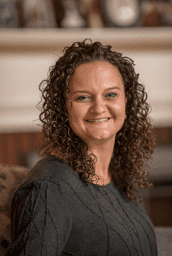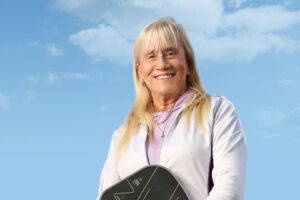After a stroke caused paralysis, rehabilitation is enabling amazing progress for this Freehold mom.
 Ulcerative colitis by itself would have been bad enough. By the time Kristin Detamore, then 35, returned to work as a school social worker after the birth of her second son, she was accustomed to the pain from inflammatory bowel disease. But the headache baffled her.
Ulcerative colitis by itself would have been bad enough. By the time Kristin Detamore, then 35, returned to work as a school social worker after the birth of her second son, she was accustomed to the pain from inflammatory bowel disease. But the headache baffled her.
Unfortunately, the headache soon turned into something much more severe: partial paralysis in which Kristin could only move her head and neck. The diagnosis was cerebral venous sinus thrombosis, a rare form of stroke in which a blood clot forms in the venous sinuses, preventing blood from draining from the brain. Nearly five years later, Kristin can still recall the desperation she felt as a young mother fighting for her life.
“It was horrible,” she says. “Being away from my kids was the hardest part of it all. But my family and my faith gave me the strength to hang on.”
When Kristin finally transitioned from the neurological unit to a rehabilitation facility, she was fully paralyzed. She had one goal: to walk out of the rehab center, however unrealistic it might have been. Fortunately, she was used to defying the odds and left on two feet.
“It was not a good walk, but it was a walk,” she says. “I told myself I was going to do it, and I did.”
Making Progress with Outpatient Rehabilitation
Kristin’s perseverance served her well in facing the next challenge: learning to walk with a more stable gait. Since 2014, she has been receiving outpatient therapy at CentraState’s OceanFirst Rehabilitation Center—transitioning from a mix of physical therapy, occupational therapy, and speech therapy to physical therapy alone. Alison Spiler, PT, her physical therapist, likens Kristin to a therapist’s dream.
“She sees a goal and goes for it,” Spiler says. “She is open to anything, and that makes it really fun to work together.”
Spiler tries to create therapy situations similar to what Kristin experiences in real life—particularly when parenting her two sons, now ages 6 and 9. Treadmill exercises that focus on balance and gait are a favorite.
“CentraState has been tremendous,” Kristin says. “Alison and the other physical therapists always ask me what I’m struggling with and try to find ways to work on it.”
Immobility in her left foot is an issue, so Kristin wears a brace to help it move. While the physical limitations can be draining at times, she continues to make progress in her recovery.
“My oldest son wants me to run around the backyard with him,” Kristin says, since he remembers her doing just that before the stroke. “I tell him mommy is working on it.”
For more information about CentraState’s OceanFirst Rehabilitation Center, call 866-236-8727.





